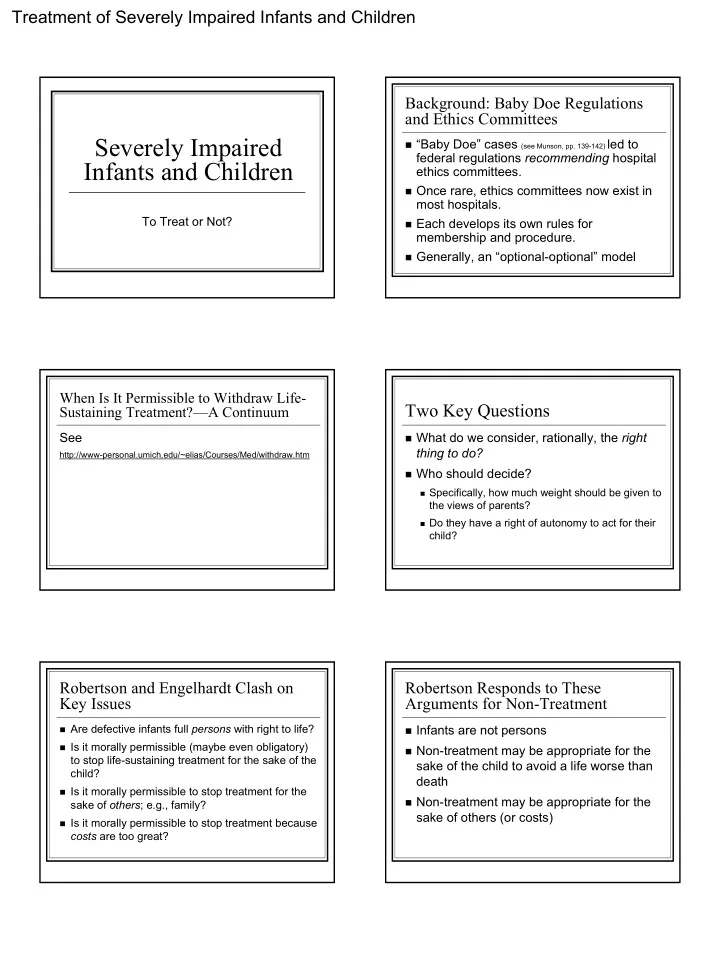

Treatment of Severely Impaired Infants and Children Background: Baby Doe Regulations and Ethics Committees Severely Impaired � “Baby Doe” cases (see Munson, pp. 139-142) led to federal regulations recommending hospital Infants and Children ethics committees. � Once rare, ethics committees now exist in most hospitals. To Treat or Not? � Each develops its own rules for membership and procedure. � Generally, an “optional-optional” model When Is It Permissible to Withdraw Life- Two Key Questions Sustaining Treatment?—A Continuum See � What do we consider, rationally, the right thing to do? http://www-personal.umich.edu/~elias/Courses/Med/withdraw.htm � Who should decide? � Specifically, how much weight should be given to the views of parents? � Do they have a right of autonomy to act for their child? Robertson and Engelhardt Clash on Robertson Responds to These Key Issues Arguments for Non-Treatment � Are defective infants full persons with right to life? � Infants are not persons � Is it morally permissible (maybe even obligatory) � Non-treatment may be appropriate for the to stop life-sustaining treatment for the sake of the sake of the child to avoid a life worse than child? death � Is it morally permissible to stop treatment for the � Non-treatment may be appropriate for the sake of others ; e.g., family? sake of others (or costs) � Is it morally permissible to stop treatment because costs are too great? Medical Ethics 1
Treatment of Severely Impaired Infants and Children “Infants Are Not Persons” Robertson: both rights oriented and Robertson’s Response consequentialist (added to original online slides) � Infants must be considered persons. � Rights (implied): “…based on the view that all living creatures are sacred, contain a spark of the (Is Robertson’s argument completely nonconsequentialist, as one would expect?) divine…” (648-1) � Robertson opposes Tooley’s argument Below is Tooley’s argument: � Consequentialist: Excluding some from care � To have a right to life one must have a desire to poses dangers of abuse continue to exist � Denying care has an effect on our whole view of � To have a desire to continue to exist, one must what it is to be a child and affects other children have the a sense of self over time (cf. genetic abortion) � Tooley: since early infants lack this, they are not � Implicitly: consider “symbolic significance” persons with a right to life Larger Issue: Can We Judge that An “No Obligation to Treat When Infant’s Own Life Infant’s Life is Worse than Death? Would Be Terrible”—Robertson’s Response � Robertson: Even impaired life better than often � Robertson: “one who has never known portrayed [normal capacities] will judge differently � Robertson: nearly impossible for someone else to � Proxy judgment likely to invoke its own judge that infant’s life not worth living interests � What about grossly deformed, retarded, � BUT: can we not judge that an infant is institutionalized child with incessant pain “where suffering? continued life is itself torture”? See Robertson’s response, p. 651-1 Engelhardt: Parents May Decide Not “No Obligation to Treat When Burden On to Treat in Many Cases Others Is Too Great” –Robertson’s Response � Families can be helped so that burden not � Children are not persons in full sense overwhelming and even some benefit � Nontreatment justified if either � “assistance MAY be available” (p. 652-1; my emphasis) � Quality of life will be very poor � “the problem may not be insurmountable” (652-2) � Costs (financial, psychological) great � Health professionals’ problems are significant but � The decision is one for parents comparatively minor � Costs to society � Exception: children should be protected from parental decision not to treat if child can have good quality of life � Questions the cost-benefit calculations of others and not a severe burden (p. 656-1) � Saving money doesn’t justify violating rights. Medical Ethics 2
Treatment of Severely Impaired Infants and Children Costs Alone Can Justify Not Treating Symbolic or Expressive Significance � “Treatment that is very costly is not � “As long as parents do not unjustifiably neglect the humans in those roles so that the value and obligatory” (p. 655) purpose of that role (that is, child) stands to be � “The argument should hold as well where eroded (thus endangering other children), society the expected future life would surely be of need not intervene. normal quality, though its attainment would � “In short, parents may decide for or against the be extremely costly” (p. 656-1) treatment of their severely deformed children.” (p. 656-1) Engelhardt: May Even Be an Obligation Not to Treat � In some cases continued existence is an injury for the child � Legal idea developing of child suing for “wrongful life.” � Is there a parallel ethical idea that we should accept? Medical Ethics 3
Recommend
More recommend